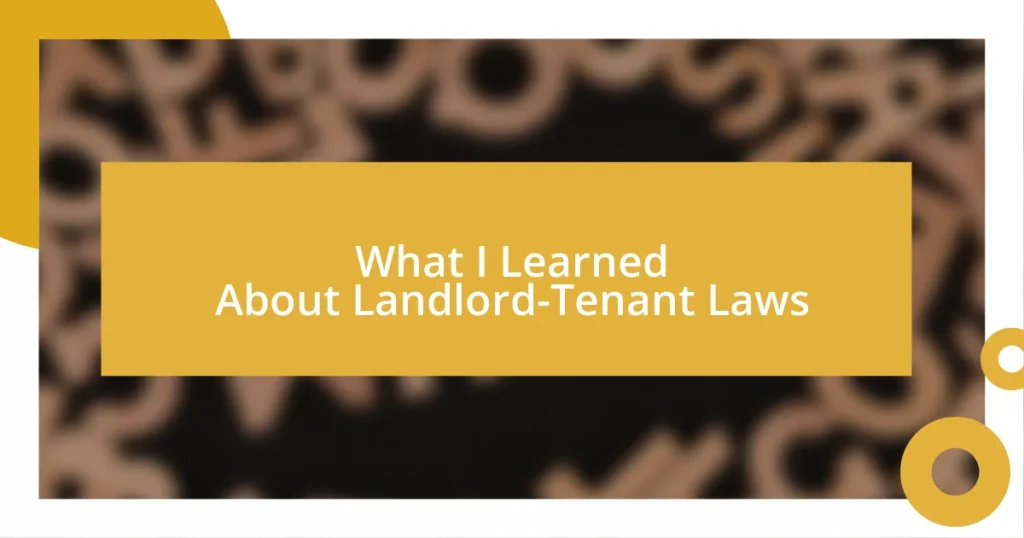Key takeaways:
- Landlords must provide a safe living environment and address maintenance requests promptly to foster a positive rental experience.
- Tenants have essential rights, including the right to a safe home, privacy, and a fair return of their security deposit, highlighting the importance of understanding these rights.
- The eviction process is complex for both parties, necessitating clear communication and knowledge of legal requirements to prevent misunderstandings and emotional distress.
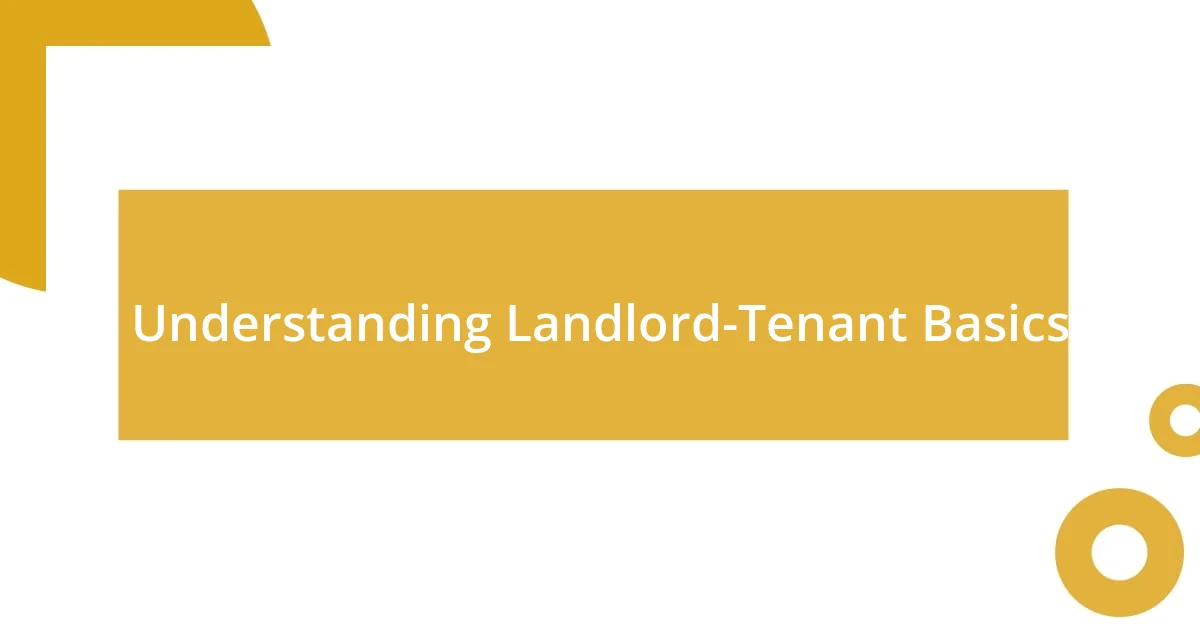
Understanding Landlord-Tenant Basics
When I first dived into landlord-tenant laws, I quickly learned that these relationships are governed by specific rights and responsibilities. For example, landlords must provide a safe and habitable living environment, while tenants are obligated to pay rent on time and maintain the property. Isn’t it interesting how these rules create a framework that can either foster cooperation or lead to conflict?
I remember reading about one case where a tenant, frustrated by a lack of heating during winter, decided to withhold rent. It seemed like a bold move at the time. However, it backfired when the landlord initiated eviction proceedings. This incident highlighted to me the importance of understanding the laws that govern these situations—without that knowledge, tenants might unintentionally jeopardize their living arrangements.
One thing I’ve realized is that clear communication is vital in landlord-tenant relationships. Have you ever had an issue where a simple conversation could have solved everything? I’ve seen tenants and landlords navigate misunderstandings just by sitting down and discussing their concerns openly. Building that rapport can often prevent legal complications down the line.
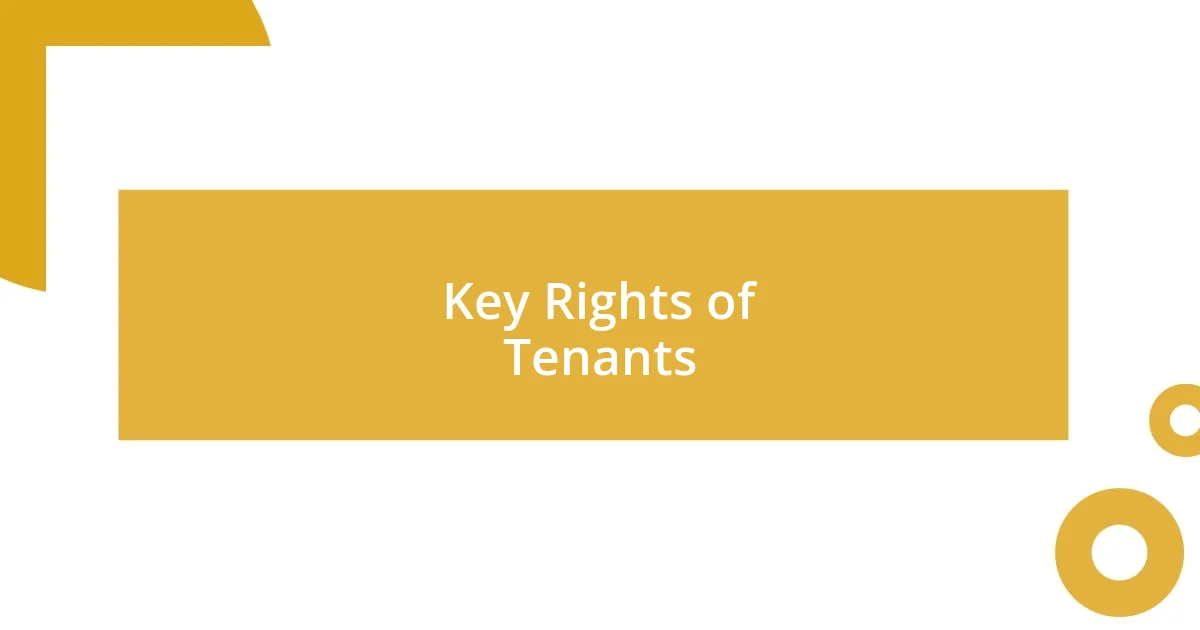
Key Rights of Tenants
Tenants have several key rights that are essential for protecting their well-being and ensuring a fair rental experience. One of the most vital rights is the right to a secure and safe living environment. I recall a friend who moved into an old apartment, only to find issues like mold and broken locks. It was eye-opening for them to learn that they had the right to report these problems and demand repairs. Understanding this right not only fosters a sense of security but also encourages tenants to advocate for their living conditions.
Another important right is the right to privacy. Landlords often feel the need to check on their properties, but tenants must be given proper notice before anyone enters their home. I remember when my neighbor’s landlord entered without warning, thinking it wouldn’t be an issue. My neighbor felt violated and uncomfortable, highlighted how crucial it is for tenants to know their right to privacy, which allows them to feel safe in their own space while maintaining necessary boundaries with the landlord.
Additionally, tenants have the right to a fair return of their security deposit. It’s a little known fact that a landlord can’t just keep the deposit for minor damages. I once had to fight my way to get my deposit back after a landlord claimed excessive wear and tear on the apartment. Thankfully, I had documented the condition of the unit thoroughly, and it allowed me to argue my case effectively. This experience taught me the importance of knowing about security deposit rights and proactively documenting issues or conditions upon moving in.
| Tenant Rights | Description |
|---|---|
| Right to Safe Living Environment | Tenants are entitled to live in a property that is safe and habitable. |
| Right to Privacy | Landlords must provide proper notice before entering the rented premises. |
| Right to Fair Return of Deposit | Tenants should receive their entire security deposit back, barring legitimate damages. |
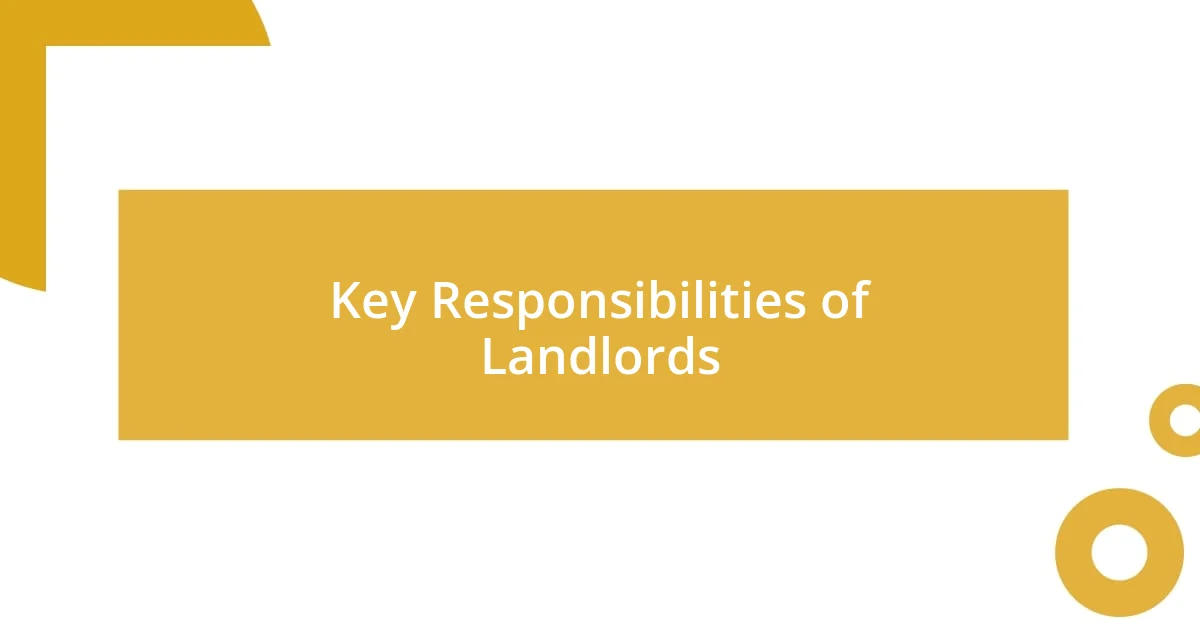
Key Responsibilities of Landlords
I’ve come to realize that landlords bear significant responsibilities that are crucial for maintaining a positive rental experience. One particularly eye-opening moment for me was when I read about the obligation to make timely repairs. It may seem common sense, but I recall a situation where a friend faced persistent plumbing issues in their apartment. The landlord’s repeated delays in fixing the problem resulted in not only frustration but also property damage. This experience underscored to me that landlords must act promptly to address maintenance requests.
Here are some key responsibilities that landlords should uphold:
- Provide a Safe and Habitable Space: Landlords must ensure that the property meets health and safety standards, free from hazards like mold, pests, and structural issues.
- Timely Repairs: It’s essential for landlords to address maintenance requests in a prompt manner, preventing further issues for tenants.
- Respect Tenant Privacy: Landlords should provide proper notice before entering the rented premises, ensuring tenants feel secure in their homes.
Additionally, landlords must keep communication lines open. I vividly remember how a lack of transparency led to tension between another friend and their landlord. When issues arose, both parties were reluctant to speak up, resulting in misunderstandings that could’ve been easily avoided. Realizing that good communication fosters a cooperative relationship is a lesson I carry with me—it encourages trust and helps to prevent conflicts from escalating.
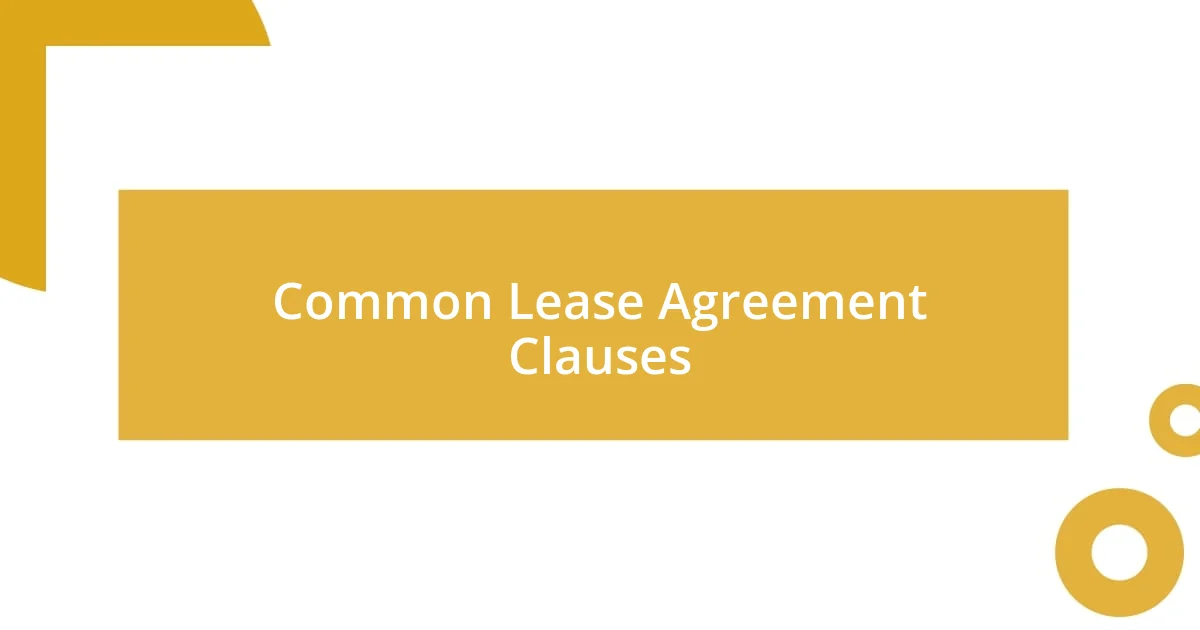
Common Lease Agreement Clauses
The lease agreement is the backbone of any rental relationship, and there are several common clauses that play a crucial role. One that stands out to me is the maintenance clause. I remember signing my first lease and thinking it was just a formality until a leaky faucet reminded me how essential it was. This clause typically outlines a landlord’s responsibility to maintain the property and what tenants should do if repairs are needed. Having this clearly spelled out not only sets expectations but also provides tenants with a sense of security knowing they won’t be left hanging in a maintenance crisis.
Another clause that tends to raise eyebrows is the pet policy. As someone who adores animals, I find these discussions particularly interesting. Some landlords allow pets with certain restrictions, while others have a strict no-pets policy. I once lived in a place that welcomed pets but required a pet deposit. This clause can foster a sense of community among pet owners while also protecting the property from potential damages. It’s worth considering whether the ability to have pets aligns with your lifestyle before signing a lease.
Lastly, the lease duration clause often sparks a lot of questions. Some leases are fixed, while others are month-to-month, which can feel like a double-edged sword. When I moved into my last apartment, I initially loved the flexibility of a month-to-month lease. However, as I settled in, the uncertainty of not having a fixed term started to weigh on me. This experience taught me that understanding the lease duration is vital—not just for planning your living arrangements, but also for peace of mind regarding your housing stability. Will you be able to plan your life without the worry of a sudden move? Knowing what to expect helps tenants navigate their living situation with ease.
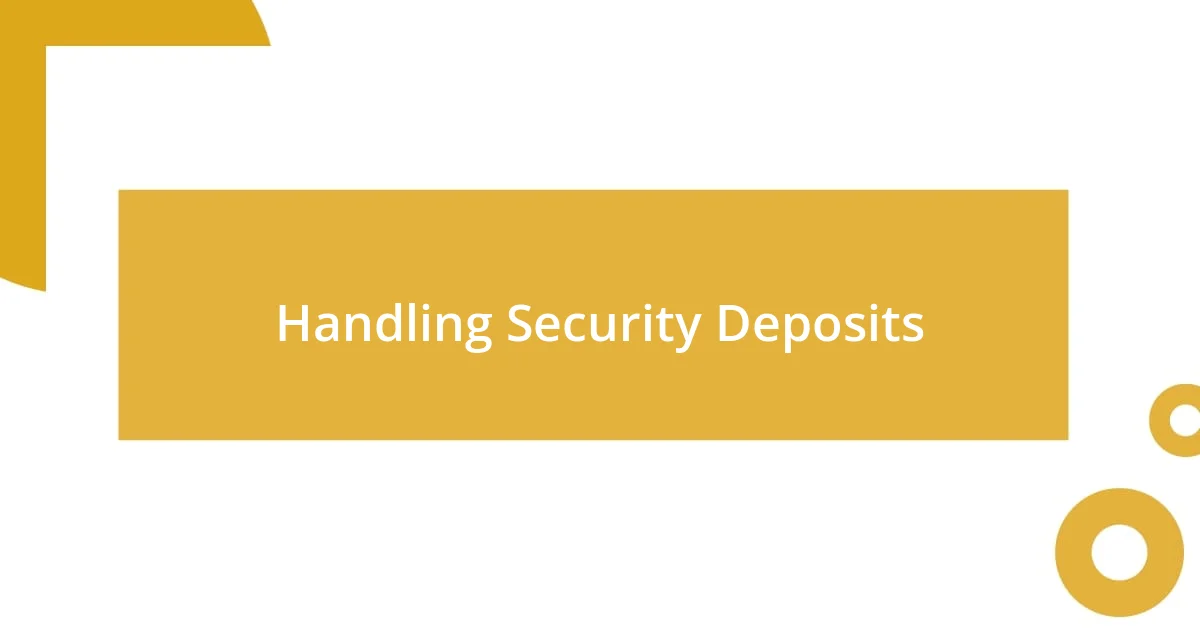
Handling Security Deposits
When it comes to handling security deposits, I’ve learned that transparency is essential. I once rented an apartment where the landlord clearly outlined the conditions for deposit return. It felt reassuring to know what to expect. This makes such a difference. Both landlords and tenants should understand any deductions that may occur and under what circumstances they’re justified. It’s about creating trust and ensuring that everyone is on the same page.
I also discovered that timely return of security deposits is mandated by law in many places. One time, my friend faced a frustrating wait for his security deposit after moving out of a rental. He finally received it, but only after several calls and reminders. This situation highlighted how important it is for both parties to be aware of the timeline—typically, a landlord should return the deposit within 30 days. Understanding this not only aids in smooth transitions but also prevents unnecessary stress.
Finally, documenting the condition of the property at the start and end of a lease is crucial. I learned this the hard way when I moved out of an apartment without taking sufficient photos. The landlord claimed there were damages that I knew were pre-existing. A simple walk-through and thorough documentation could have avoided that misunderstanding. So, if you’re renting, make sure to take detailed photos, and consider having a witness during the check-in and check-out process. This proactive step can save you a lot of headaches down the road.
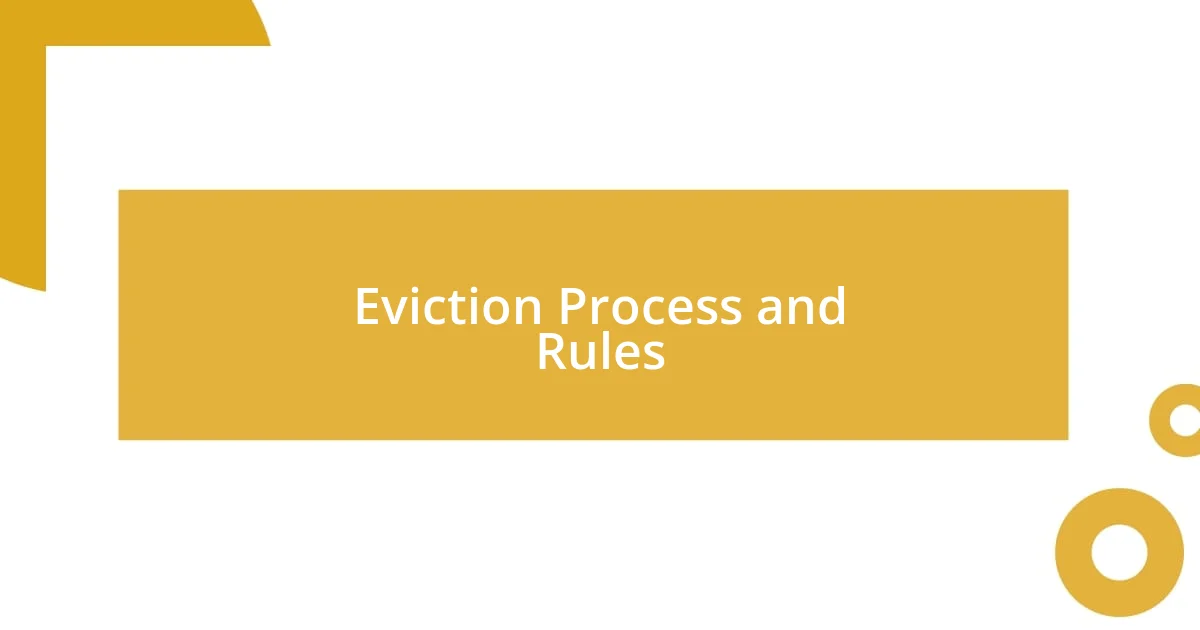
Eviction Process and Rules
The eviction process can feel daunting for both landlords and tenants, and my encounters have taught me that understanding the rules is absolutely essential. In my early days as a renter, I didn’t realize that an informal conversation about late rent could escalate into a formal eviction notice. For a landlord, ensuring proper documentation is key—I’ve seen landlords scramble to gather evidence when faced with disputes. It’s vital to provide a written notice before filing for eviction, and that notice must comply with local laws, which vary widely. Have you ever imagined how one misplaced document can lead to an extended eviction process? I’ve seen it happen, and it’s frustrating for all involved.
Once a notice is served, the next step usually involves a court appearance. I recall sitting in a courtroom once, surrounded by a mix of anxious tenants and serious landlords. It was clear that the proceedings were more than just legal formalities; emotions ran high as personal stories intertwined with legal arguments. The judge assesses whether the eviction is justified based on presented evidence and adherence to local regulations. This made me realize that the eviction process isn’t just about property but people’s lives and stability. It’s a stark reminder of how critical it is for both parties to understand their rights and obligations throughout this process.
Finally, if a tenant doesn’t respond or rectify the issue, the landlord may proceed with obtaining a judgment. In my experience, I’ve watched friends face the harsh reality of losing their home, which really highlighted the emotional aspect of eviction. It’s not just a procedural action; it can be devastating. At this stage, the landlord can typically hire a sheriff to carry out the eviction, but I always wonder—what happens next for the tenant? Understanding these rules doesn’t just protect landlords; it’s also essential for tenants to protect themselves and plan for the future. Awareness of the eviction process fosters a better understanding of the consequences of rental agreements and encourages more open communication, which can often prevent necessary evictions in the first place.
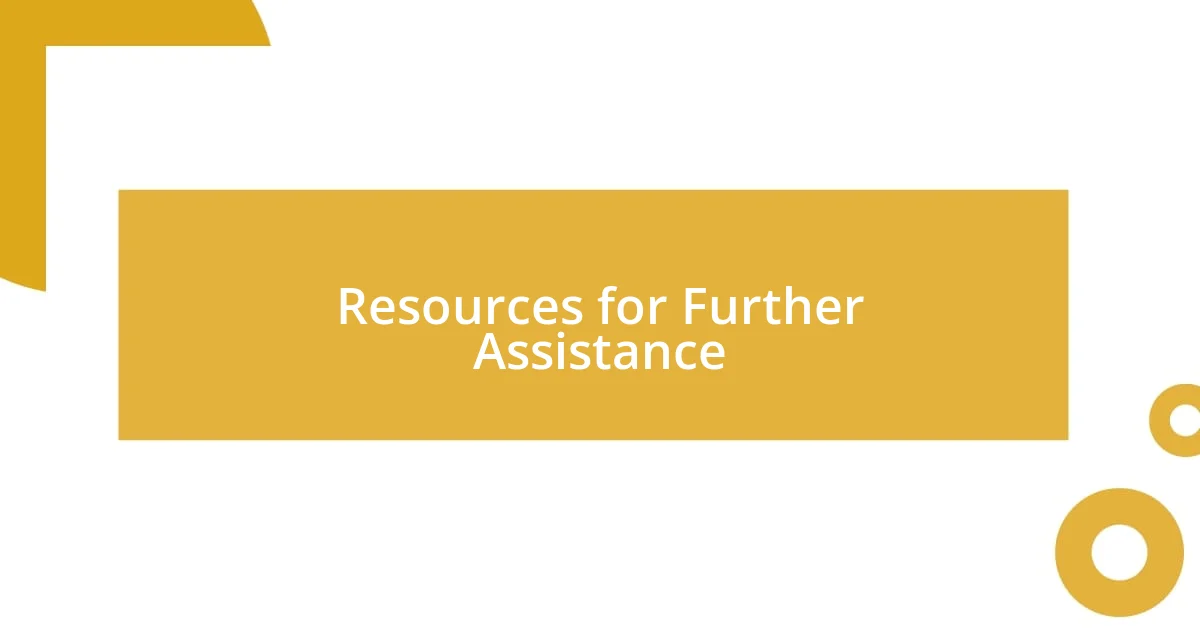
Resources for Further Assistance
When navigating landlord-tenant laws, numerous resources can be invaluable. I’ve often turned to local legal aid organizations that offer free consultations. A friend of mine found herself tangled in a lease dispute and was amazed at how much clarity these professionals brought. They helped her understand her rights, which gave her a sense of empowerment during a very confusing time.
Another excellent resource is state-specific websites that outline tenant rights and responsibilities. I remember stumbling across a state-run portal that laid out everything in simple terms—what a relief! This resource helped me grasp complex legal jargon easily, making me more confident in my dealings with my landlord. Have you ever wished for a cheat sheet in a complicated situation? These sites often provide downloadable guides that serve as handy references.
Lastly, don’t overlook community workshops or seminars on tenant rights organized by local housing authorities. I attended one recently and was blown away by the wealth of knowledge shared. It was enlightening to hear from experienced speakers and fellow tenants sharing their stories. The experience not only expanded my understanding but also fostered a sense of community support—something that reminded me we’re all in this together. These resources can turn daunting legal frameworks into manageable knowledge for everyone involved.









